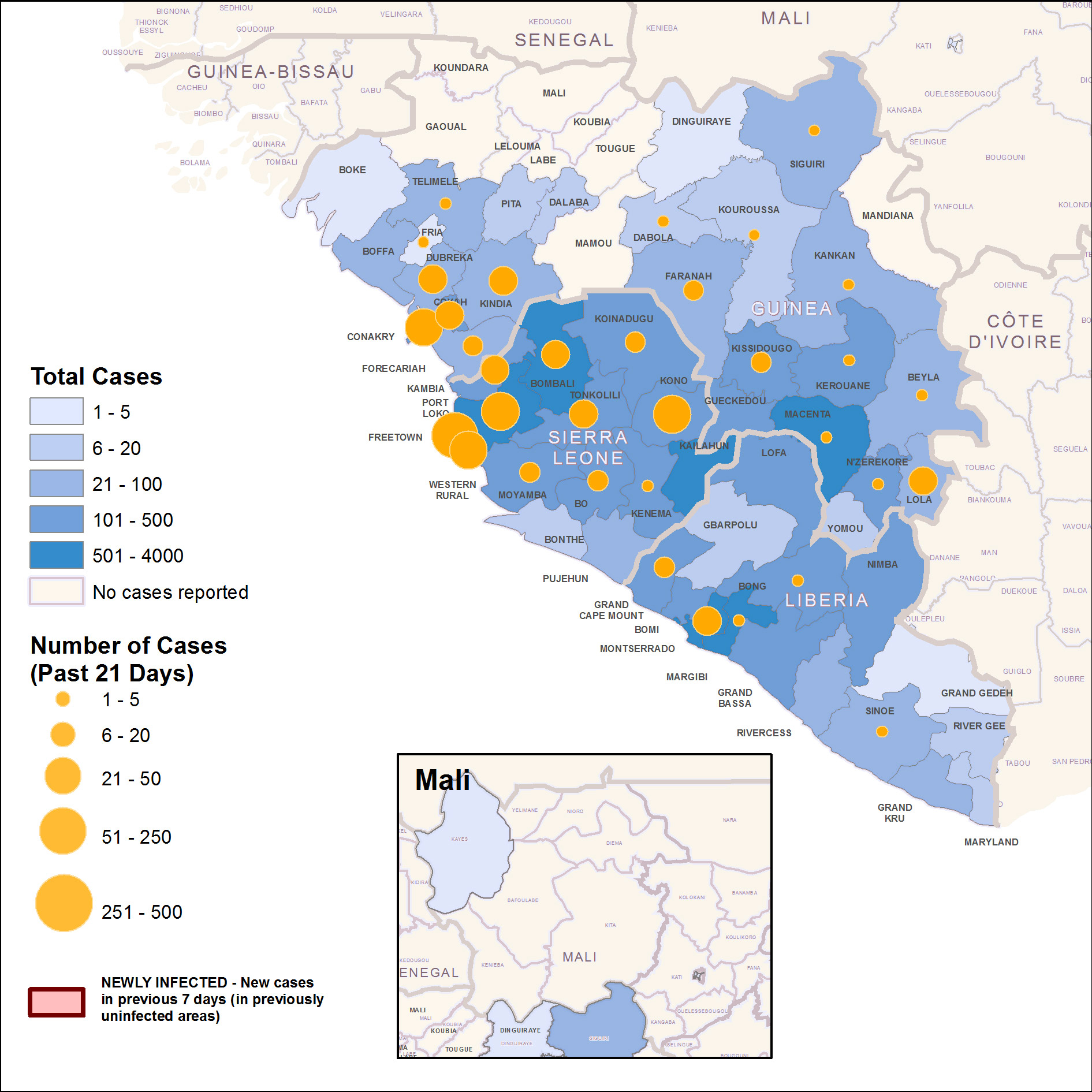Ebola virus: number of new cases on the decline in Africa
Number of new cases of Ebola at its lowest levels in months, but people are still dying

A free daily email with the biggest news stories of the day – and the best features from TheWeek.com
You are now subscribed
Your newsletter sign-up was successful
New cases of the Ebola virus have fallen to their lowest levels in months in Liberia, Sierra Leone and Guinea, the three worst affected countries in West Africa, according to the World Health Organization's (WHO) latest situation report.
A total of 21,296 people have been infected with Ebola since the deadly outbreak began in February last year and 8,429 are known to have died from the disease, although the real figure is likely to be much higher.
UN Secretary General Ban Ki-Moon last year predicted the epidemic could be over by as early as mid-2015, but the WHO is unwilling to set a target having already been proven wrong several times, Al Jazeera reports. A country will not be declared Ebola-free until it reports no new cases of the virus for 42 consecutive days, according to WHO standards.
The Week
Escape your echo chamber. Get the facts behind the news, plus analysis from multiple perspectives.

Sign up for The Week's Free Newsletters
From our morning news briefing to a weekly Good News Newsletter, get the best of The Week delivered directly to your inbox.
From our morning news briefing to a weekly Good News Newsletter, get the best of The Week delivered directly to your inbox.
The decrease in the number of cases has been attributed to an increase in international support, including more beds and treatment centres and health care workers as well an improvement in burial practices.
The current situation in:
The UK
Cases: 1
A free daily email with the biggest news stories of the day – and the best features from TheWeek.com
Deaths: 0
British nurse Pauline Cafferkey was diagnosed with the disease upon returning to Glasgow last month from working at a treatment centre in Sierra Leone. She is no longer in a critical condition and is showing signs of improvement, but continues to undergo treatment at a specialist London hospital.
A second British national, William Pooley, was officially diagnosed in Sierra Leone and later brought back to the UK for treatment. He made a full recovery after receiving the experimental drug zMapp. A woman admitted to hospital in Northamptonshire yesterday is "unlikely" to have the disease, say doctors.
Sierra Leone
Cases: 10,124
Deaths: 3,062
Sierra Leone remains the country worst affected by the disease, with transmission in the west of the country most intense. Although the number of new cases is declining, and is at its lowest since August, the country's health services still reported 184 new cases of the disease since last week.

Liberia
Cases: 8,331
Deaths: 3,538
Liberia is faring the best out of the three worst affected countries. At the outbreak's peak last year, Liberia reported 300 new cases of the virus a week, but in the last week only eight new cases were confirmed, the lowest number since June. Some parts of the country, including the Lofa region in the north, have been declared Ebola-free. Researchers in the US are predicting that the Ebola epidemic could be contained in Liberia by June if current hospitalisation trends continue Time reports. "Continuing on the path to elimination will require sustained watchfulness and individual willingness to be treated," researchers said.
Guinea
Cases: 2,806
Deaths: 1,814
Cases on Ebola continue to decline steadily in Guinea, and have now fallen to their lowest level since August last year. However fear surrounding the disease remains high and violent mob reactions to Ebola are frequent in the country, according to AFP. This week, two policemen were killed and their bodies set alight by an angry mob, when locals accused them of spreading the disease.
-
 The ‘ravenous’ demand for Cornish minerals
The ‘ravenous’ demand for Cornish mineralsUnder the Radar Growing need for critical minerals to power tech has intensified ‘appetite’ for lithium, which could be a ‘huge boon’ for local economy
-
 Why are election experts taking Trump’s midterm threats seriously?
Why are election experts taking Trump’s midterm threats seriously?IN THE SPOTLIGHT As the president muses about polling place deployments and a centralized electoral system aimed at one-party control, lawmakers are taking this administration at its word
-
 ‘Restaurateurs have become millionaires’
‘Restaurateurs have become millionaires’Instant Opinion Opinion, comment and editorials of the day
-
 Epstein files topple law CEO, roil UK government
Epstein files topple law CEO, roil UK governmentSpeed Read Peter Mandelson, Britain’s former ambassador to the US, is caught up in the scandal
-
 Iran and US prepare to meet after skirmishes
Iran and US prepare to meet after skirmishesSpeed Read The incident comes amid heightened tensions in the Middle East
-
 Israel retrieves final hostage’s body from Gaza
Israel retrieves final hostage’s body from GazaSpeed Read The 24-year-old police officer was killed during the initial Hamas attack
-
 China’s Xi targets top general in growing purge
China’s Xi targets top general in growing purgeSpeed Read Zhang Youxia is being investigated over ‘grave violations’ of the law
-
 Panama and Canada are negotiating over a crucial copper mine
Panama and Canada are negotiating over a crucial copper mineIn the Spotlight Panama is set to make a final decision on the mine this summer
-
 Why Greenland’s natural resources are nearly impossible to mine
Why Greenland’s natural resources are nearly impossible to mineThe Explainer The country’s natural landscape makes the task extremely difficult
-
 Iran cuts internet as protests escalate
Iran cuts internet as protests escalateSpeed Reada Government buildings across the country have been set on fire
-
 US nabs ‘shadow’ tanker claimed by Russia
US nabs ‘shadow’ tanker claimed by RussiaSpeed Read The ship was one of two vessels seized by the US military